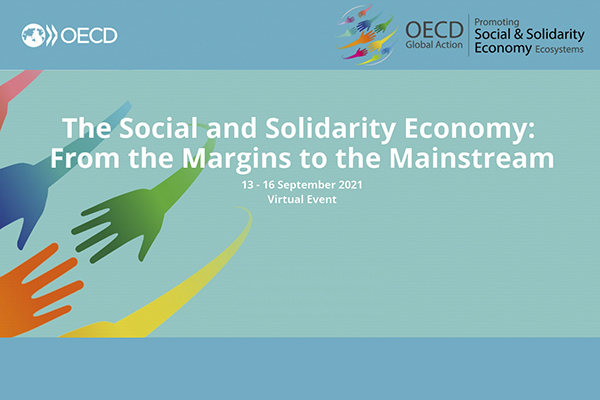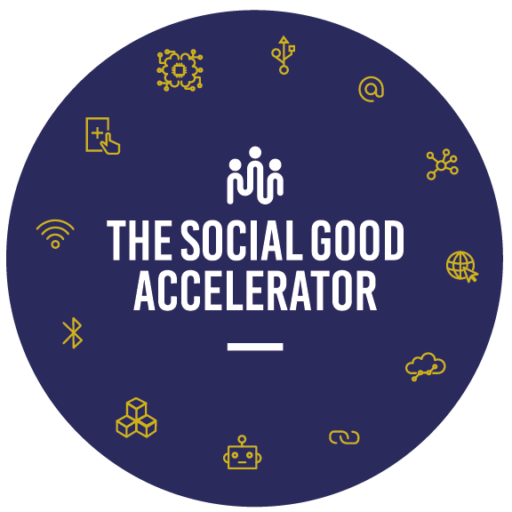Social Economy: From the Margins to the Mainstream
The Social Good Accelerator had the great pleasure to participate in the first international conference of the OECD Global Action programme from 13 to 16 September 2021. This programme launched in 2020 is dedicated to the promotion of social economy ecosystems around the world. Funded by the European Union’s External Partnership Instrument, it covers more than 30 countries over a three-year period, including all EU countries and non-EU countries such as Brazil, Canada, India, Korea, Mexico and the United States.
This event brought together hundreds of policy makers, practitioners and experts in the social economy. Speakers included Victor Meseguer (Director of Social Economy Europe), Nicolas Schmit (European Commissioner for Employment and Social Rights), Olivia Grégoire (Secretary of State for the Social and Solidarity Economy), and Guy Ryder (Director General of the ILO). On the programme: plenary sessions, high-level round tables, interactive sessions and conferences to discuss how the Social Solidarity Economy rebuilds, impacts and creates inclusive growth. A look back at this major event!

Overview of the event organized by the OECD from 13th to 16th of September, 2021.
Source: UNSSE
OECD Global Action: How do social economy serves resilience and post-Covid recovery?
The Global Action programme was born out of the recognition that social economy can help address growing inequality, persistent unemployment and environmental imperatives. These issues have indeed become priority political issues, especially with the pandemic. Thus, the OECD promotes the idea that social economy is a way – if not the best way – to contribute to building more inclusive and sustainable economies and societies. Indeed, social economy has proven to be an agent of inclusive growth. Thus, the Global Action project aims to promote inclusive, smart, resilient and sustainable growth, within the framework of the OECD and EU strategic objectives and around the Social Economy. More specifically, the objectives of this programme are
– To support social economy, including the development and internationalisation of social enterprises.
– Raise awareness and build capacity to construct national and local ecosystems favourable to the development of social economy.
– Promote knowledge and other exchanges at international level.
For an international development of the social economy and its virtuous values
The social and solidarity economy is attracting increasing attention, both nationally and internationally, as a driver of inclusive and sustainable economic development and recovery. Indeed, governments can rely on the social and solidarity economy to achieve their broader policy objectives by unlocking its potential. There is thus a strong political impetus to further support it, which the OECD wishes to maintain by increasing its visibility. Social economy helps policy makers to improve people’s lives and stimulate innovation. Strengthening social economy through its linked organisations should thus help to make this marginal activity mainstream, because the benefits of social economy go beyond the mere economic aspect.
However, it is important to remember the potential for economic growth that this sector represents. Nicolas Schmit indeed underlined that social economy represents between 1% and more than 10% of the economy in the Member States, thus highlighting a real potential for job creation in the EU. Moreover, social enterprises represent 10% of the EU’s enterprises and create a social impact on local populations while creating jobs. The jobs in this sector are also quality jobs that allow for the social inclusion of vulnerable people in the labour market. Thus, the EU (especially through the Commission) and the OECD are working together to create favourable policies for global action to promote social economy and its ecosystem.
The challenges for its development
Beyond the budgetary challenges blocking its integration into the general economy, Olivia Grégoire recalled three issues around social economy that will facilitate its development:
#1 – Simplification: There is an urgent need to simplify the life of social economy actors, especially with regard to the European structure and on the issue of access to aid schemes. In fact, there is often a very long time between applying for funding and receiving a response. Therefore, Olivia Grégoire, the French Secretary of State for Social Economy, highlights the idea that political and public players should facilitate access to funding by creating dedicated funding windows and offices at the heart of Europe.
Moreover, social economy stakeholders are sometimes buried in the heart of mainstream economic schemes and thus have difficulties to prove the specificity of their model to administrations. This is also the reason why one-stop shops are needed to enable them to address these specificities.

The Château de la Muette in Paris, one of the main building of the Organisation for Economic Co-operation and Development’s headquarters
Source: MySociety, Flickr
#2 – Cooperation: This concept is at the heart of the SSE and constitutes its historical raison d’être. Thus, Grégoire highlighted successful SSE models, mentioning in particular the case of Acome (SCOP leader on the European network market). This structure is very competitive and beats the Chinese and American models in terms of innovation. However, it does not have a mutual recognition system, which tends to block its development in Europe and internationally. This example is therefore indicative of the fact that Social Economy players must be able to develop, as they represent a real potential for growth. Unfortunately, they still face regulatory barriers, particularly in Europe. For example, a French ESUS must restart if it wants to develop internationally, which is extremely long and complex.
#3 – Innovation: Finally, it is a question of giving the financial means to the SSE to develop in an innovative way. Thus, Social Impact Bonds could be an interesting solution. This new type of private-public partnership based on performance and impacts (social, solidarity and environmental) is in fact at the service of SSE and can be a relevant and innovative source of financing.

Founding members (dark blue) and members (light blue) of the OECD
Thus, as Guy Ryder pointed out, social economy organisations play a key role in the recovery. The International Labour Organization (ILO) has provided 93 recommendations that highlight the values of social economy: justice, equity, solidarity, social responsibility. This is what is expected of the economy today. The agenda also recalls that the 110th session of the International Labour Conference will take place next June, during which experiences will be shared in order to make political decision-makers and citizens understand that social economy is part of the answers that society expects, in terms of value production but also of social results and solidarity.
Social economy, “a precious asset for humanity” (Patrizia Toia, Member of the European Parliament), must therefore move from the margins to the mainstream, and for this to happen, it is necessary to “open the windows and doors of the house that is social economy so that it represents not 10% of the GDP but 30%, as it is capable of doing (Olivia Grégoire).

